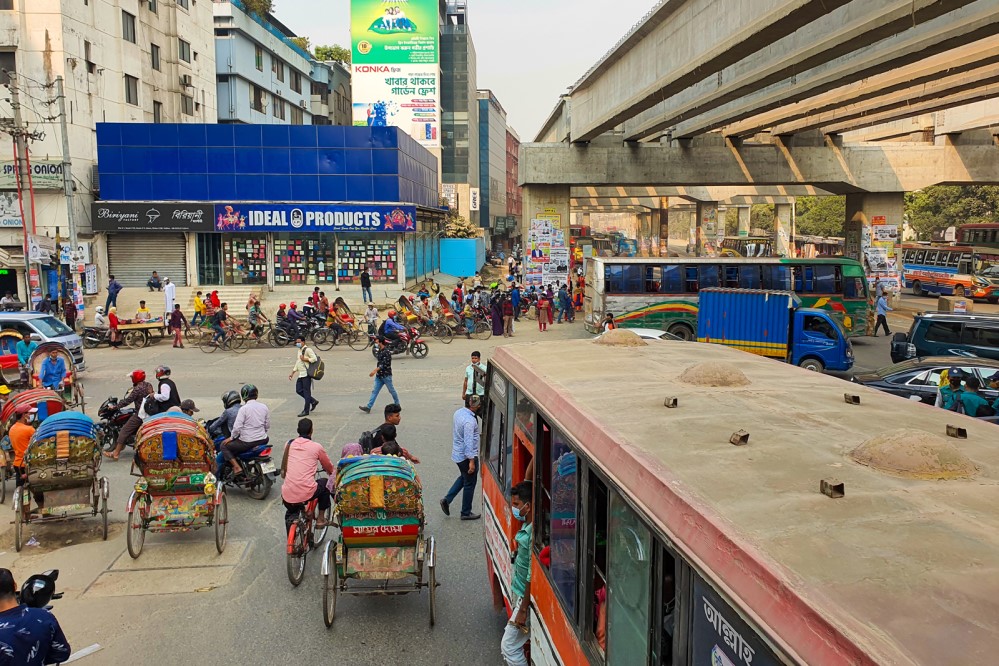
Since August 2019, ICMA has implemented a new program in Bangladesh, the Community Resilience Initiative. The program, which concludes in May 2021, is funded by the U.S. Department of State and focuses on countering violent extremism by building community resilience, particularly improving the well-being of their youth.
To accomplish this, a sustainable, community-based, multidisciplinary intervention program was designed for vulnerable youth in the pre-criminal space in two communities in Dhaka, Bangladesh. There is growing concern about violent extremism in Bangladesh due to several incidents in the past decade.
ICMA’s approach to building community resilience in two neighborhoods—Sayedabad and Uttara—is predicated on engaging and connecting community members through various avenues. Engaging with the community includes working with youth role models who serve as mentors to 60 younger counterparts, as well as local professionals in a range of disciplines, to create a multi-layered initiative.
At the outset of the program, ICMA conducted 30 semi-structured key informant interviews1 among various key stakeholders, experts, and service providers; a poll of 365 Dhaka youth; and 10 focus group discussions. (Key informant interviews are qualitative in-depth interviews with people who know what is going on in the community.) These were supplemented by dozens of outreach and consultative meetings, as well as review of relevant research, publications, and open-source materials by the project team. The results of this research showed that while there are many projects and efforts aiming to prevent and counter violent extremism (P/CVE) in Bangladesh, they are mostly focused on awareness-raising, peace-building, educational, and capacity-building efforts. There seemed to be an absence of any systematic and wholistic intervention programming for prevention of violent extremism focused on the individual in the pre-criminal space.
Community-Based Groups
Operating in the absence of precedent in Bangladesh and as a part of ICMA’s approach to using existing community resources, ICMA established two community-based governance groups to help guide the direction of a first-of-its-kind intervention program. The first is a Strategic Advisory Committee composed of five to 10 multidisciplinary professionals with national-level recognition who advocate for policies and practices aimed at the prevention of violent extremism (PVE) and well-being of youth, assist in foreseeing and mitigating program risks, and inform program staff about concerns related to government and other important stakeholders and advise them accordingly.
The second group is a Multidisciplinary Practitioner Panel composed of 10 to 15 varied practitioners living or working in the target communities, including educators, PVE practitioners, youth programming specialists, psychosocial service providers, psychologists, school counselors, social workers, local religious figures, and training experts. They review progress on intervention efforts, contribute to programming content, bring lessons learned on intervention for PVE into their own institutions and professions, and advise the ICMA program team on additional existing community facilities or services that could be accessed for the benefit of the youth.
Mentorship
While these two groups provided strategic guidance on the program, a cadre of approximately 30 youth role models (mentors), aged 21–30, provide mentorship to the program’s 60 mentees. Forming mentor-mentee relationships within the same community is another significant step in ICMA’s approach of using community resources to engage with the community. The mentors—recruited directly out of the target communities—provide mentorship to younger mentees and pass along skills they’ve learned both through their lived experience and training provided by ICMA and its partners. Mentors and mentees jointly attend biweekly meetings based on themes such as goalsetting, decision making, conflict management, problem solving, and coping with emotions and stress. These meetings are supplemented by one-on-one meetings between the mentees and a local psychosocial service provider. Most importantly, the mentors serve as peer companions, giving mentees a sense of community that they may have previously lacked.
Encouraging Results
Three months into the pilot program, initial results are already promising. Nearly half of the mentees have expressed a decrease in frustration. Ninety percent of the mentees now feel that they are part of a group that values them, a 22-percent increase from the start of the pilot. Eighty-three percent of mentees now feel they have peers who help them feel better when they are feeling sad, anxious, or frustrated—a 26-percent increase from the start of the program.
By enhancing their positive social support network, connecting vulnerable youth to community resources such as peer mentors who are successful adults in their community, ICMA is helping to foster resilience in these communities and put youth on a better path. And by piloting this program in the most challenging of environments, ICMA can modify the pilot program to assist municipalities around the world build community resilience by implementing similar programs.
Visit the Community Resilience Initiative page for more information about the project.

LEE GERSTON is a senior program manager in ICMA’s Global Program Management team, and manages the CRI Project in Bangladesh (Lgerston@icma.org).
New, Reduced Membership Dues
A new, reduced dues rate is available for CAOs/ACAOs, along with additional discounts for those in smaller communities, has been implemented. Learn more and be sure to join or renew today!
